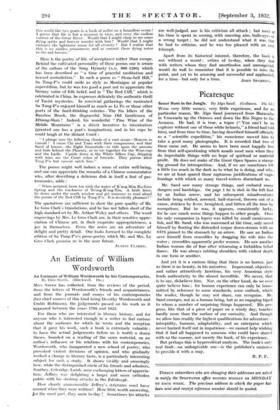Picaresque
Senor Bum In the Jungle. By Algo Sand. (Gollancz. 10s. 6d.) WITH very little money, very little experience, and for no particular reason, Mr. Algo Sand 'journeyed from Maracaibo in Venezuela up the Orinoco and down the Rio Negro to the Amazon. He had, it is true, a topee (".. You can't be an explorer without one of those white helmets," a friend had told him), and from time to time, having described himself officially as a " scientific expedition," his conscience moved him to take a good many photographs. It is recorded that two of these came out. He seems to have been most happily free from that self-questioning which assails most men when they do improbable things with no: hope of spiritual or material profit. He does not make of the Great Open Spaces a stamp- ing ground for introspection. And, if we are sometimes left a little too much in the dark as to what he is doing, and why, we are at least spared those rapturous justifications of vaga- bondage with which so many travel-writers disenchant us.
Mr. Sand saw many strange things, and endured many dangers and hardships. On page 1 he is shOt in the left foot by an Indian arrow, and his subsequent misadventures include being robbed, arrested, half-starved, thrown out of a canoe, stricken by fever, benighted, and bitten all the time by mosquitoes. But he was, it appears, consistently lucky, for he saw much worse things happen to other people. Once his only companion (a leper) was killed by small carnivorotri fish, and Mr. Sand, who was marooned at the time, only saved himself by floating the distended corpse down-stream with an SOS pinned to the stomach by an arrow. He saw an Indian save himself from crocodiles by dragging his wife into the water ; crocodiles apparently prefer women. He saw another Indian woman die of fear after witnessing a forbidden tribal dance. He was always rubbing shoulders with violent death in one form or another.
And yet it is a curious thing that there is no horror, just as there is no beauty, in his narrative. Impersonal, objective, and rather attractively facetious, his very American style lends authenticity to the almost incredible. We never, that is to say, disbelieve him. Nor, on the other hand, do we ever quite believe him ; for human experience can only be trans-
mitted by reference to some standards, some outlook, which the reader, though he may not share, can recognize. Mr.
Sand emerges, not as a human being, but as an engaging biped to whom a number of surprising things happened. His pro- gress, like that of a piece of paper on a windy day, touches hardly more than the surface of our curiosity. And though we allow him readily the highest qualifications for adventure— intrepidity, humour, adaptability, and an enterprise which never burned itself out in impatience—we cannot help wishing that it had all happened to someone who could have shared with UJ the essence, not merely the husk, of his experience.
But perhaps this is hypercritical analysis. The book's only real fault—an unforgivable one—is the publisher's omission to provide it with a map.
R. P. F.






























 Previous page
Previous page